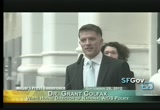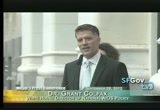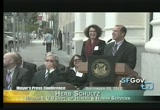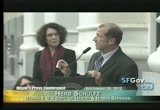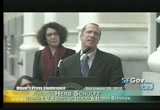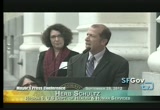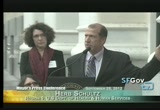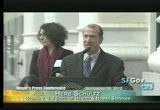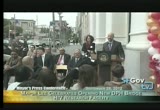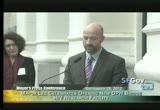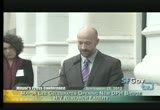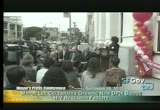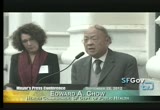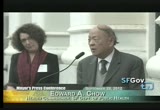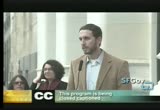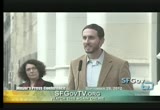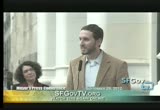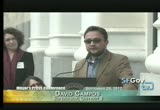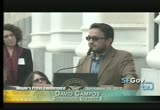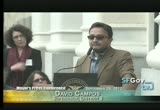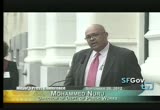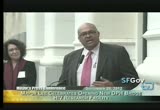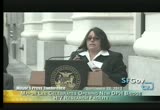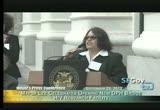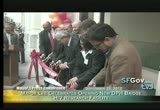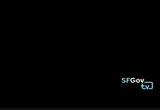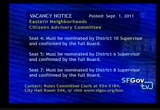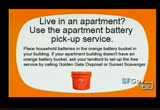tv [untitled] October 24, 2012 10:30am-11:00am PDT
10:30 am
affordable care will increase coverage for 30 million more americans. (applause) >> just incredible. and that includes, that includes tens of thousands of americans living with hiv, tens of thousands of americans living with hiv will be able to access comprehensive health care, medications, and hiv testing. and there are so many different aspects of the affordable care that will directly benefit people living with hiv. one of them i want to point out as a reese -- recent provider myself, people with hiv cannot be prohibited. (applause) >> i work with many of you in this audience. how many conversations have we had with people saying i don't want to get tested right now. i don't have insurance, i'm afraid i'm going to lose my insurance. this is transformative. san francisco figured this out a while ago, the comprehensive health care really makes the
10:31 am
difference not only at the individual level, but for increasing community health and wellness. so, again, a real signal -- real shout out to san francisco for your leadership. and a real signal to how we can potentially move forward as a nation. so, thank you. so, san francisco has been a model city for over 30 years in hiv prevention care and treatment. we look forward to working with you at the national aids policy. we are going to continue to do a lot of outreach, conversations, figuring out how to bring the community voice to the federal level. it is always helpful for us to remind ourselves what have we done today to prevent new hiv infections. what have we done today to improve somebody's life living with hiv. and we know to recognize and to realize the present vision of an aids regeneration, we need to continue to build more bridges, which is like this. so, thank you very much and congratulations. (applause)
10:32 am
>> thank you, brandt. next i'd like to introduce herb schultz who is the regional director -- regional 9 director of the department of health and human services. come and speak to us. thank you. (applause) >> hi, region 9 u.s. department of health and human services. [laughter] >> it's a mouthful. it is a real honor and a pleasure to be here with you this morning. and first off, i want to ask you all to give yourselves a round of applause for the leadership of this community and of san francisco and the bay area and california broadly. (applause) >> you know, it's an honor to get up here and represent my boss, secretary kathleen sebelius and be like brandt colfax, another round of
10:33 am
applause for dr. colfax, please. (applause) >> to have a reinvest and recovery act, our stimulus law with the leadership of leader pelosi, of our mayor, of our supervisors, and our community to have $9-1/2 million given to this city and to this area for this. but not just for this, but everybody's already setting this this morning, the local impact, the state impact, the national impact, and indeed the international impact. and i represent a region that is 50 million people. california, arizona, nevada, hawaii, it's a three territories and three countries in the pacific. and i could tell you that i have moved around my region. i've been working with the hiv/aids and other communities
10:34 am
throughout our region. do you know how many people have said to me, i got my information through san francisco? (applause) >> that is something to be really proud of. you know, i'll tell you a little bit of a personal story as we -- i move on. imagine september 16th, 1991, your young 29 year old, gay man living in washington, d.c., fulfilling your dream to be a lobbyist. and your physician calls. hi, sam. hi, herb. imagine i had hair, i had very curly hair. [laughter] >> and bill wilson has pictures of it and i know he's here. and he said, herb, i think you ought to come to my office. and i said, why? and he said, because, you know, you had some tests recently. i know, i had the flu, i came
10:35 am
in, i did some tests. what's up? you need to come to my office. and these are the pills. and a week-and-a-half ago sunday, september 16th, 2012, as i sat in the synagogue during rosh hashanah services with my partner of 14 years, i reflected on the fact that that was 21 years ago. and even though i was active in the community, i turned to my friends in d.c., we didn't have the internet. remember that, anyone remember that? i see young people here. you don't know what that's like. think of a world with pink messages and no voice recorders. and i said, we have great resources here and i want to go and i want to talk to people, but where do you find the best research? because at this point in time
10:36 am
we're talking about 1991. there wasn't the poet east inhibitors i have in my pocket. there wasn't anything but azt. i can't even say the word any more, bactrim. i'm not a provider, as you can tell. how many times do we reflect every day about the people that we lost and what emboldens us today is that this world class research institution is not only saving lives by treating, but it's coming up with revolutionery cutting edge prevention techniques. and i'm very proud to work for the obama administration, for secretary, as grant said, that has not only focused on treatment and research, but prevention in so many things. and, so, my story is not
10:37 am
unique. but on behalf of the obama administration, on behalf of secretary kathleen sebelius, i'm here to say thank you for the work of san francisco and the local, at the state, and at the national/international level has done for more than 30 years that have saved lives, that have built commutes, that have allowed families to come together and grow. because this is not 1981. it's almost 2013. and this place is revolutionery and this 9-1/2 million will continue to make it the pinnacle of world research and prevention on hiv. so, thank you very, very much for having me here. (applause) >> i just looked over my shoulder and here is dr. george
10:38 am
rutherford, director of the aids office when i came here many years ago. we have many generations of individuals who work and contribute to the work we all do here. next i'd like to introduce dan bernal who is the district director under house democratic leader house pelosi and is going to speak next. thank you. (applause) >> thank you. thank you, dr. bookbinder. great to see so much leadership here including the aids foundation marking its 30 years leadership fighting the prevention of hiv/aids this weekend. of course judy auerbach, we're thankful for grant colfax working in washington entrusting him with aids polecy. every time hiv/aids is threatened for san francisco, mayor ed lee comes to washington. he walks the halls, he commands the attention and respect not only of leader pelosi, but
10:39 am
everybody that's necessary to help save what we need here in san francisco. so, thank you mayor lee for your leadership as well. (applause) >> leader pelosi couldn't be here today, but she asked me to share some words with you from her, which i'll do now. dear friends, thank you for invieedthing me to participate in the official ribbon cutting ceremony for the san francisco department of public health's new bridge hiv research facility. while i am unable to be with you in person, i joan you in celebrating the opening of the state-of-the-art research center which was constructed with federal funding through the national institutes of health and the american recovery and reinvest act. i would like to recognize two outstanding leaders in our fight against hiv/aids. your executive director dr. susan bookbinder and director of public health barbara garcia. also please join me in thanking mayor ed lee for his leadership in assuring that san francisco ans living with hiv/aids continue to have access to the care they need. (applause)
10:40 am
>> the fight against hiv/aids has been one of my top legislative priorities for 25 years. as one of the earliest and hardest hit cities, san francisco has also been at the forefront of responding to the crisis of hiv/aids. from our community-based system of care to the cutting edge research at ucsf. working together we apply san francisco's model on a national scale with the creation of the ryan white care act, housing opportunities for people with aids and the national aids strategy. now with the passage of the affordable care act, we will ensure that everyone including hiv patients has ensurance of the ability to afford lifesaving medications. with the addition of the federally supported bridge hiv research facility, our city will continue to lead the way as we strive for better treatments, a vaccine, and finally a cure to the scourge of hiv/aids. i will continue working in congress to ensure our nation investments in research and
10:41 am
medical advances based focused on new treatments, care, prevention, and early intervention and expand housing opportunities and end discrimination for people with hiv/aids. thank you again for your leadership and best wishes for a memorable ribbon cutting ceremony. best regards, nancy pelosi, democratic leader. thank you. (applause) >> thank you. and we are again so happy to have our federal representatives, our state representatives, and i am next going to introduce commissioner chow who is with our health commission. on the local level we have tremendous support and tremendous innovation. (applause) >> thank you. and i am indeed privileged to be here on many levels. and there's been so much and reminiscing of how we have all gone through the aids epidemic. i am reminded that as a private
10:42 am
practitioner back in the '80s and as the president of the san francisco medical society at that time, we took on the fight here in california to bring to the california medical association and ultimately to the nation the san francisco model and how we were going to care for our people here in san francisco. there was not going to be discrimination. there was going to be full access to all care that our citizens and our residents needed here, whatever the problem was. and we were going to fight aids. i've been privileged over these last 20 some odd years to also being able to assist with the city's policies and regards to being a member of the health commission. and i am so proud that today we're seeing the culmination of research facilities that as mayor lee has pointed out will become part of our world class
10:43 am
innovation for san francisco. so, coming from trying to serve individuals who had aids all the way to the final answer, as i heard dr. bookbinder tell us that the health commission was on the verge of what i hope was in this building we're going to be able to do, we from the health commission are extremely proud that our city has been able to be at the forefront on a national and world level. i congratulate everybody. i thank president obama. i thank all of our federal, state, and local officials who have continued to support the effort of the health department of our private practitioners, of all those who are here in this final effort to end the epidemic of aids. thank you very much. (applause)
10:44 am
>> thank you. next i'm going to introduce supervisor scott weaner from district 8 who is going to -- always supported the work that we've done here. and thank you for coming. (applause) >> thank you, thank you. and i want to wish a very happy birthday to my colleague supervisor david campos. (applause) >> it seems like just yesterday that we were here and we had our hard hats on, and we were breaking the wall there when some friends of mine saw the photos, they told me i should not be wearing a hard hat. [laughter] >> it was a learning experience. so, you know, 30 years ago san francisco, we had to start going it alone. we had the epidemic break out here and we weren't getting a lot of support from the federal government and the state
10:45 am
government. and this city did what we often do here. we pulled together and we got it done. and we took care of our community and we developed innovative ways for prevention and for treatment and for making sure that people living with the disease had access to services. and fast forward 30 years, and this city continues to lead. and continues to be innovative and continues to be a beacon frankly to the rest of the world in terms of addressing the epidemic. and i wrote -- mayor lee mentioned it before, but i really want to stress how important it was when we lost $7 million in federal money in prevention and care money. and let me tell you, i remember supervisor campos and i sitting down and looking at each other, what are we going to do? this is a disaster. and we went and spoke with the mayor. mayor lee didn't even blink, and he restored in his budget all of that money. some mayors may have restored
10:46 am
half of it and let the board scramble to find cuts or other readjustments to make up for the rest of it and mayor lee did 100% no game. mr. mayor, we are eternally grateful for that. (applause) >> and i think this, what we're doing today, is also incredibly important because for those of us who were there when it wasn't such a foregone conclusion that we were going to be able to come out of this epidemic and even see the light at the end of the tunnel, there are a lot of young people who weren't there. and who maybe don't understand what it was like and what can happen and maybe don't always take it as seriously as we need to take it in terms of prevention. and when i came out in 1990 as a 20-year old, one of the first
10:47 am
things i did, i went out to the bars of my lesbian cousin who was 14 years older and her partner, they said to me, you really need to start out with gay guys. you shouldn't just be hanging out with lesbians. my cousin's partner said to me, you know, i really wanted to bring out some of my gay guy friends tonight, but they're all dead. for me as a 20-year old, that was permanently seared in my memory. you know, i've been careful ever since. but for a lot of younger guys in particular, didn't necessarily go through that. but this is so incredibly important that we continue to lead the way in terms of prevention and education and research because we can beat this disease and i know we're going to. so, congratulations, everyone. (applause) >> i'm pleased to introduce from district 9 supervisor
10:48 am
david campos. (applause) >> thank you very much. i'll be very brief, and this is definitely a great birthday present. you know, i've known scott weaner for many years. we went to law school together, and i think something he said about our youth today is something that is very, very important for us to remember. you know, as youth, you always have the concept of the invincibility of youth and we've all had that. you're a young person, you don't think that anything can happen to you. but the reality is that for folks who are part of this newer generation, they didn't go through that. and i think it's important for us to underscore the severity of this disease, of this illness, and it's still des mating many communities. and it is especially low-income communities, communities of color, you have gay african-american men, latino men infected on a daily basis.
10:49 am
people forget we still have people dying of aids. i had a close friend of mine who recently passed away of aids, michael goldstein, and he was an advocate for hiv prevention for finding a cure for hiv. and you can think of so many michael goldsteins. and dr. colfax and other people mentioned that. their memory lives on. and i think that we owe it to them to continue to recommit ourselves, rededicate ourselves to making sure that we prevent the spread of this disease, and that we do find a cure for this disease. and i just think about, you know, the possibilities with this building. this could well be the place where we do find a cure for aids. and if it's going to happen anywhere, why wouldn't it happen in san francisco? we have always led the way on so many different things. you know, the city of harvey milk is a city that has always recognized the dignity and humanity of every person and
10:50 am
it's in line with that spirit that we are here today. and i do want to thank our mayor because as supervisor weaner noted, when the $7 million of funding was cut, even though we were lucky that for so many years leader pelosi protected that, the mayor did not blink. the mayor wasn't even a question. and that's the beauty of san francisco. that when it comes to these issues, making sure that we take care of our own, that those questions are no-brainers for us. that is the san francisco way. so, i am very excited. i look forward to seeing the beautiful building, the gay man in me wants to see the design what it looks like inside. [laughter] >> so, let's get this going. thank you very much. (applause) >> thank you. i want to say that this has been a collaborative effort on so many levels. and it's been a collaborative effort in the city as well. i want to next introduce mohammed nuru director of public works who was
10:51 am
instrumental in helping us launch this project. (applause) >> thank you. i'll keep it brief. i just want to say thank you to the department of public health for being a great partner with dpw. we've had a good opportunity to be able to renovate many of our health centers. we are building the new hospital and today this very, very great project. the project from dpw, we provided architectural design. we provided engineering and construction management. and i'd like to thank the team that worked on the project real quick, the project's architect, lamont and banito, please give them a hand. (applause) >> from the engineering james ing and ray louie, give them a hand. (applause) >> and for construction administration jose gordato. (applause)
10:52 am
>> and, of course, from the public health side, mark primo from dpw, [speaker not understood] who both led these projects. a little quick note about the project itself, the building is over 100 years old. and while all this work was going on, nobody in the building and all the people who work here, they were not disrutctionved. they were able to continue working. * disrupted and as you heard we are 70% complete and very, very happy to be here for this grand opening. and as we heard from all the speeches today, it will be a world renowned center and public works is happy to be part of that. thank you very much. (applause) >> so, none of this could have happened without the support of the public health department. we are fortunate to be working under dr. thomas argon who
10:53 am
heads up the population public health unit. we are led by barbara garcia who is also the principal investigator of this project and i'm going to turn it to her. clap lap >> okay. as supervisor campos said, he can't wait to get inside. one of the things about this grant, the face of staff is usually a grant with research. it is either study participants or services. but this is a little different one. we were the only health department in the country to receive this. most of this went to universities. one, we didn't have as big overhead as universities do. two, we have a lot of experience in doing building. and, so, we really had to work at making sure nobody got disrupted. i do believe i have a big thank you to real estate because i think we did give them i understand general election a couple times out there. -- indigestion i want to thank them.
10:54 am
i see win of the employees who resigned as a retiree, he was instrumentsal. (applause) >> this took space planning and trying to figure out space and it's all you know in san francisco, space can be a conflicting process. i think this worked really well. mark primo consulting with us on all our capital projects and departments. martin who provided a lot of leadership in this area. [cheering and applauding] >> and now that everybody is clapping, let's do the ribbon cutting and get inside. [laughter] >> okay. we're going to now do our ribbon cutting and then we're going to invite everybody in to tour the facility to get some hot coffee or tea, warm up, and some snacks. and if we could have the mayor and barbara come up and all of our other esteemed guests.
80 Views
IN COLLECTIONS
SFGTV: San Francisco Government Television Television Archive
Television Archive  Television Archive News Search Service
Television Archive News Search Service 
Uploaded by TV Archive on

 Live Music Archive
Live Music Archive Librivox Free Audio
Librivox Free Audio Metropolitan Museum
Metropolitan Museum Cleveland Museum of Art
Cleveland Museum of Art Internet Arcade
Internet Arcade Console Living Room
Console Living Room Books to Borrow
Books to Borrow Open Library
Open Library TV News
TV News Understanding 9/11
Understanding 9/11